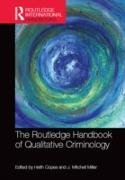Despite illustrious origins dating to the 1920s, qualitative crime research has long been overshadowed by quantitative inquiry. After decades of limited use, there has been a notable resurgence in crime ethnography, naturalistic inquiry, and related forms of fieldwork addressing crime and related social control efforts. The Routledge Handbook of Qualitative Criminology signals this momentum as the first major reference work dedicated to crime ethnography and related fieldwork orientations. Synthesizing the foremost topics and issues in qualitative criminology into a single definitive work, the Handbook provides a "first-look" reference source for scholars and students alike.


